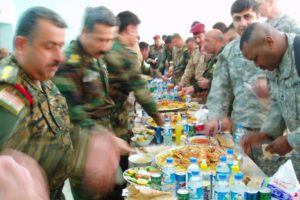Reserve Chaplaincy

When young missionaries head to the field, how do they balance financial and family needs? This article discusses one creative approach—the Army Reserve Chaplaincy. My family headed to the mission field nearly 30 years ago, trusting God for retirement and health coverage. We shopped for an agency that would get us to the field fast and would accept a support schedule based more upon what was coming in than upon what was required. Then, after seven years, special needs in our children meant stateside assignment with even greater support-raising challenges.
Yet God has provided for our family’s needs and answered those early prayers in some unpredicted ways. Very soon, I’ll be retiring from the Army Reserves with the salary and benefits of a retired full Army Colonel. I had left the Army Reserves for an interim while we were overseas, but today I can see that overseas ministry and Army Reserve Chaplaincy can be highly compatible. So how can missionaries, missionary candidates, or people on home staff also be Chaplains, and why might they want to do that?
First, many missionaries and some home staff can easily qualify to become Army Reserve Chaplains. It takes an M. Div. or equivalent from an accredited institution, and sponsorship by a recognized and multi-congregation religious institution. It also takes the ability to pass the check for a security clearance. Once commissioned as an Army Officer, Reserve Chaplains have three years within which to complete eight weeks of basic officer training, which can be broken up into two-week segments. For this training, the Army provides a salary plus daily expenses and transportation costs to and from the training. This can take place from anywhere in the world that you can call your residence.
Second, benefits of a Reserve Commission can reduce the support-raising burden. Besides a generous salary for part-time work, here is a summary of other benefits:
- Inexpensive Serviceman’s Group Life Insurance (SGLI) with inexpensive riders for a spouse
- Generous salary in retirement in exchange for 20 good years of service (though it may take some effort and thoughtfulness to plan a “good year”)
- Portable retirement Thrift Savings Account (TSA), which acts like an IRA with matching government contributions
- Commissary and Exchange shopping privileges
- Free space-available travel on both domestic and international military passenger fights
- Tuition assistance for continuing education
- Possible tuition and stipend for accredited degree programs up to four years that’s transferrable to children
- APO, FPO and DPO mail to and from overseas government addresses, bypassing international postage rates, if you are qualified to use one of those addresses.
- Inexpensive and robust TriCare Reserve Select (TRS) family medical insurance and dental coverage
- Pre-boarding on many domestic airline flights as a “Thank you for your service”
- Access to USO lounges at most major airports
Third, work as an Army Reserve Chaplain offers ministry and growth opportunities. In my own year of combat zone service, I provided pastoral care to several dozen small teams of military personnel who were embedded into Iraqi police, border security, and military units. It was challenging, fulfilling, and strategic to my own missionary calling. After that I shaped hundreds of current and future chaplains by teaching part-time at the Army Chaplain School. For the past five years I’ve been working part-time for several 2-star Generals. In one assignment, I helped guide my general through pastoral care issues in Homeland Defense and Defense Support to Civil Authorities (DSCA). In addition to advising a 2-star General, my current role has me supervising over 60 other chaplains, while training them to pastorally care for Civil Affairs and Information Operations Soldiers who work closely with foreign civil authorities. The synergy between my civilian and military ministries has been truly amazing.
The Army offers three kinds of Reserve programs: The Troop Program Unit (TPU), the Individual Mobilization Augmentee (IMA), and the Individual Ready Reserve (IRR).
The IRR program takes the least commitment. It requires just one paid duty day annually for verifying medical and administrative readiness. But IRR Soldiers can have a hard time getting enough duty points to count for a good retirement year. Fortunately, Chaplains have many opportunities to provide voluntary unpaid services for retirement points. For example, an Army Reserve Chaplain could probably earn retirement points by volunteering to provide occasional pastoral care at a US Embassy, National Cemetery, military base, or university ROTC program.
The IMA program supports Active Duty units and offers good flexibility. It requires 38 duty days in a fiscal year. The days can be used all at once or spread out into any combination through coordination with the supported Active Duty unit.
The TPU duty cycle is the one most commonly associated with the Reserves. It requires one weekend a month and two weeks a year. TPU Chaplains are assigned to an Army Reserve unit. They become an advisor to that unit’s commander and a pastor for that unit’s Soldiers.
All three Reserve programs offer access to the Army’s Professional Military Education (PME) system. It’s a combination of courses with correspondence courses (for which you are not paid) and paid residence portions, through which Chaplains maintain eligibility for promotion. The residence training occurs in 2-week increments. Initial Chaplain training consists of four of these 2-week residence increments. These can be taken all at once or spread out over three years. Mid-career training requires two 2-week increments with a correspondence curriculum between. Advanced-career PME can take many shapes. I did mine by correspondence course for 18 months with two weeks of paid training-in-residence at the end.
In conclusion, the synergy between the service of a military Chaplain and a missionary may make serving as a reserve Chaplain worth considering. The training and experience can be valuable professional development, and the benefits can help fill gaps in missions support.
To contact Bruce Sidebotham: Email: bruce.t.sidebotham.mil@mail.mil, Phone: 719-287-3910
More information about the Army Reserve Chaplaincy can be found here.
This article was submitted by Bruce Sidebotham, a contributor to Missio Nexus. Would you like to submit an article to us too? Click this link to see how.






